The quiet crisis among African Americans: Pregnancy and childbirth are killing women at inexplicable rates
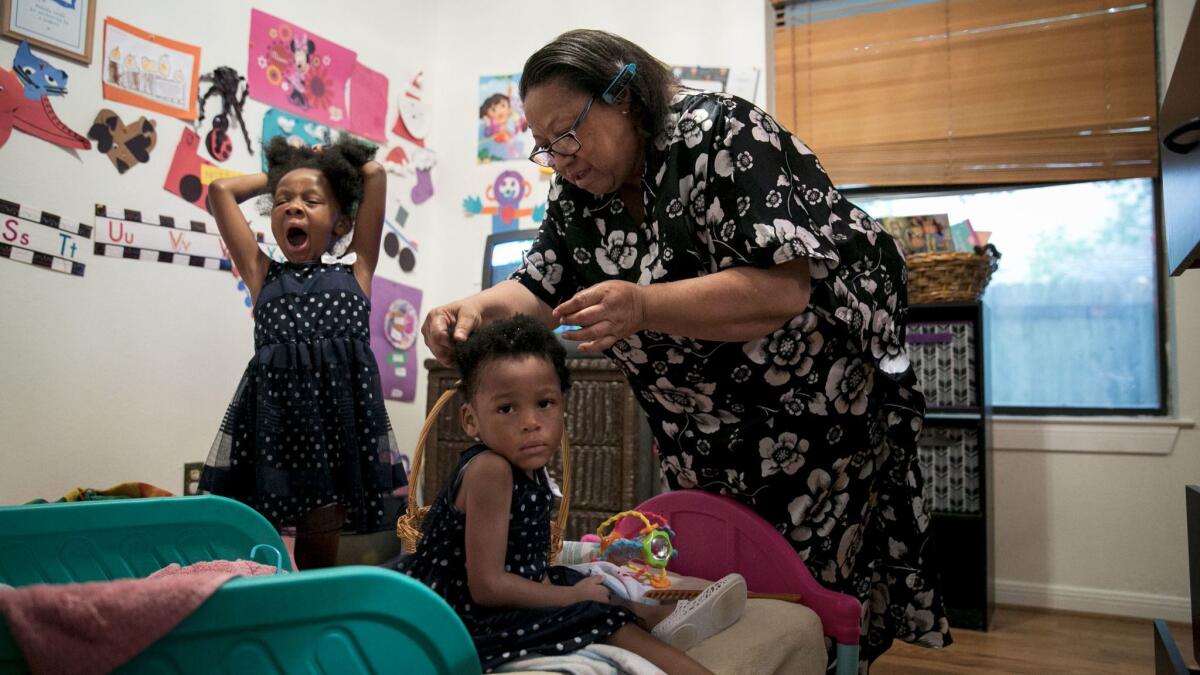
- Share via

Three weeks after Cassaundra Lynn Perkins gave birth to premature twins, she returned to the hospital, feeling unwell. She phoned her mother from her hospital bed at 3:30 in the morning.
“I’m just not feeling good,” she said.
Surely it was just another bout of the mysterious illness her daughter had been suffering from for most of her pregnancy, Cheryl Givens-Perkins thought as she rushed over to San Antonio’s North Central Baptist Hospital.
When Givens-Perkins walked into the room, her 21-year-old daughter looked exhausted. She begged her mother to comb her hair.
“I need to get ready,” she said. “Please get my hair in order.”
“She may have known she was dying,” Givens-Perkins said.
Every year, around 700 women in the United States die as a result of pregnancy or delivery complications. As many as 60,000 expectant mothers suffer problems that come close to costing them their lives.
America is one of the most developed nations in the world. Average life expectancy has been generally increasing over at least the last five decades, and deaths from illnesses that were once widely fatal, including polio, smallpox, tuberculosis and AIDS, are sharply falling.
Yet when it comes to the natural process of childbearing, women in the U.S. die in much higher numbers than those in most developed nations, where maternal deaths are generally declining.
A woman in the U.S., where the maternal death rate more than doubled between 1987 and 2013, is more likely to die from pregnancy-related causes than in any country but Mexico among the 31 industrialized countries of the Organization for Economic Cooperation and Development that reported data.
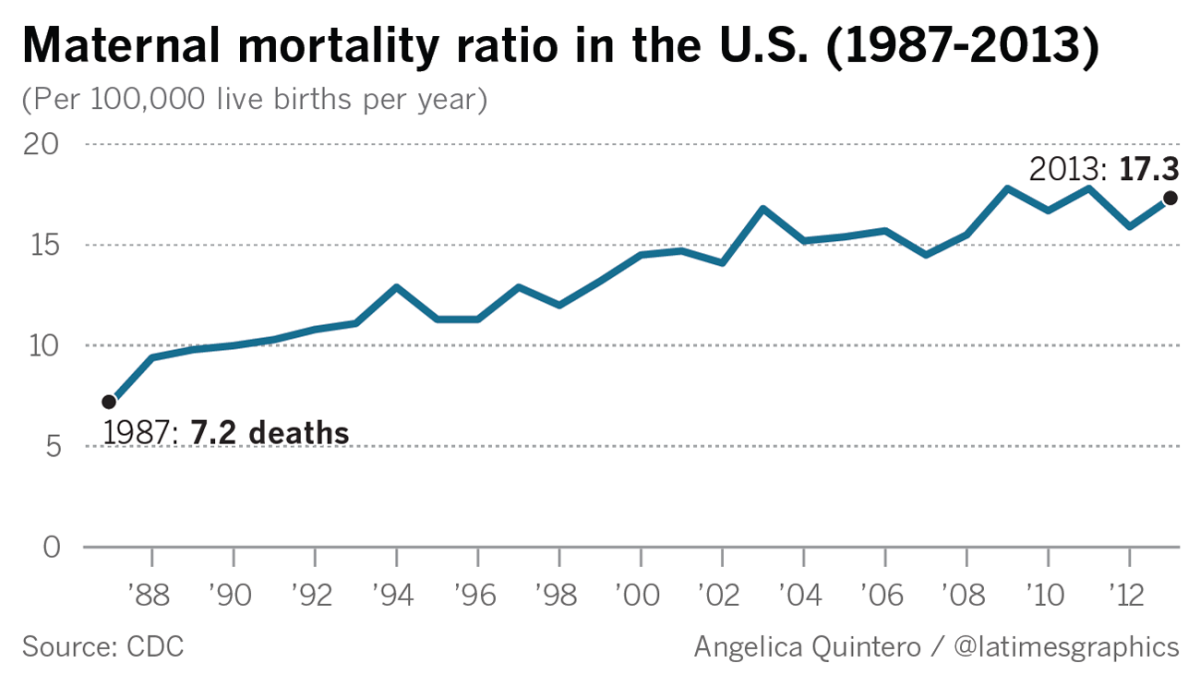
There are various theories why — persistent poverty, large numbers of women without adequate health insurance, risk factors related to stress and discrimination. All come together here in Texas, with a twist that has become one of America’s most confounding public health problems: African American women are dying of pregnancy- and childbirth-related causes here at stunningly high rates.
The maternal death rate in Texas after 2010 reached “levels not seen in other U.S. states,” according to a report compiled for the American College of Obstetricians and Gynecologists, based on figures from the U.S. Centers for Disease Control and Prevention.
Black women in Texas are dying at the highest rates of all. A 2016 joint report by the Texas Department of State Health Services’ Maternal Mortality and Morbidity Task Force found that black mothers accounted for 11.4% of Texas births in 2011 and 2012, but 28.8% of pregnancy-related deaths.
“This is a crisis,” said Marsha Jones, executive director of the Afiya Center, a Dallas-based nonprofit that has taken on the issue. In May, the center published its first report: “We Can’t Watch Black Women Die.”
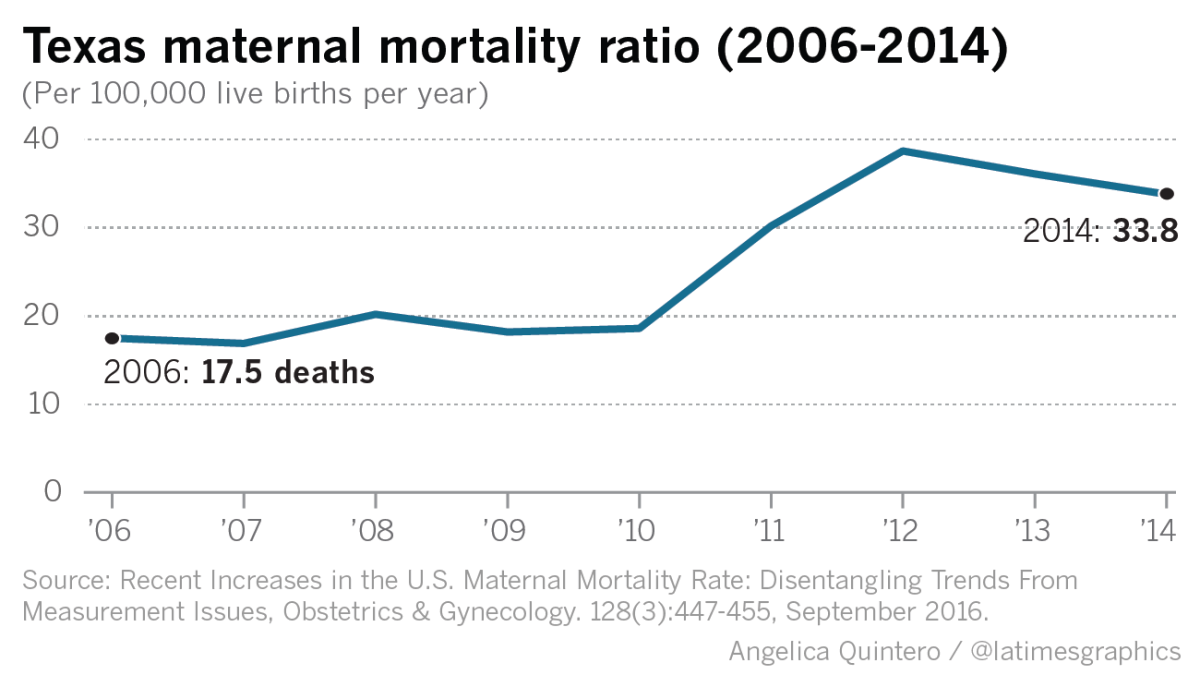
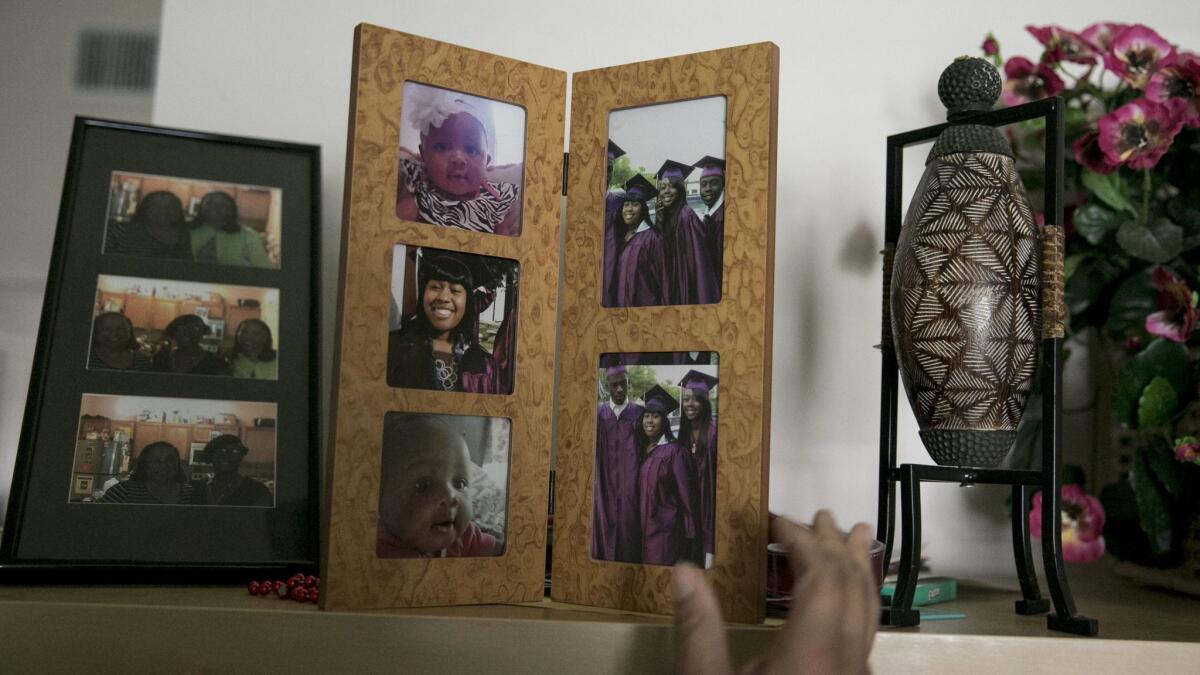
Perkins, who already had a 2-year-old, worked at Great Clips salon and hoped to one day open her own salon. Her pregnancy with twins in 2014 was challenging.
“She was sick to where she could not keep anything down,” Givens-Perkins said.
Doctors said it was an infection. Then six months into her pregnancy, Perkins’ liver started to fail, and doctors decided to induce labor.
The babies arrived on Aug. 13, 2014, each weighing about 2 pounds. They were rushed to the neonatal intensive care unit.
Perkins was discharged from the hospital after three or four days. But something seemed wrong, her mother recalled: “She was never 100%.”
Doctors and researchers are struggling to make sense of the rise in maternal mortality in Texas.
“There isn’t a single thing that explains it,” said Lisa Hollier, an obstetrician-gynecologist who heads the state-appointed Maternal Mortality and Morbidity Task Force. “There are so many different factors.”
The task force compared the health of a group of women who died during pregnancy, childbirth or in the immediate aftermath to those who survived in 2011 and 2012.
Cardiac events, drug overdoses and disorders associated with hypertension were the leading causes of those maternal deaths, the task force found.
Nationally, problems such as obesity,
“So we have a population of women that is less healthy when they are entering pregnancy,” Hollier said.
Black women also had the highest rate of being hospitalized for hemorrhaging and blood transfusions, which are commonly seen in maternal deaths in Texas.
Texas has the largest number of uninsured people in the U.S., and there have been substantial cuts to women’s health programs that offer family planning and other routine services to low-income women, including screening for diabetes, hypertension and cervical cancer, which if left untreated could play a role in maternal deaths. Many of the dozens of clinics shuttered in recent years due to slashed state funding also offered prenatal care.
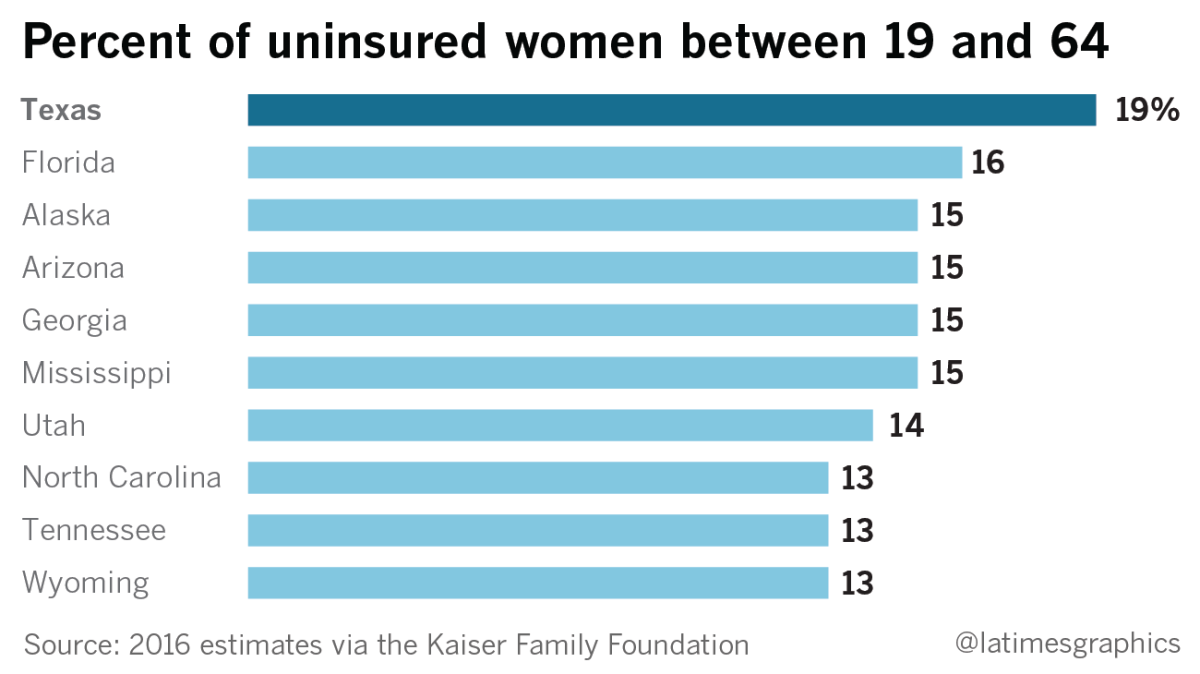
“In an ideal world, a woman would have the opportunity to have a visit with a physician before she becomes pregnant to identify any potential risk factors before she gets pregnant,” said Hollier. “Then a woman would enter prenatal in her first trimester. Unfortunately, African American women are the least likely to have that first trimester of prenatal care.”
Texas public health officials say they are concerned about the state’s high maternal mortality rate but they don’t believe cuts to women’s health clinics are to blame, noting that the decrease in funding did not take effect until after the increase in maternal mortality had been reported.
“There’s not any evidence that suggests a link,” said Chris Van Deusen, a spokesman for the Department of State Health Services. “The timing doesn’t really match up to demonstrate that there’s any connection.”
Manda Hall, associate commissioner for community health improvement at the agency, said several initiatives are underway to address the maternal mortality crisis. They include a program that encourages women planning to become pregnant to make wholesome lifestyle choices and another targeting historically black academic institutions that offers training focused on preconception health, the importance of fathers, health disparities and reproductive life planning.
Researchers say such programs might have an effect, but given that low-income white women fare better than black women, the causes may run deeper.
“Just being a black woman in America comes with its own level of stress,” said Jones, the Afiya Center executive director.
Some studies have shown that chronic stress triggered by racism and discrimination can lead to health problems such as diabetes and high blood pressure, and these in turn can lead to preterm births, low birth weights and life-threatening complications.
A 2009 study published in the journal Social Science & Medicine by researchers from USC and Harvard examined the differences in the self-reported racism experiences of U.S.-born and foreign-born black pregnant women, and found that “chronic exposure to racial prejudice and discrimination could ... contribute to physiological wear and tear, thereby increasing health risk.”
African American women also say that healthcare professionals are often dismissive of their concerns if they are poor, have health problems or already have several children, said Deneen Robinson, a researcher and program director for the Afiya Center.
“We go into facilities and they speak condescendingly to us,” Jones said. “They rush us through the process. They downplay when we talk about what our symptoms are.”
In Perkins’ case, her mother recalls that health providers seemed to disapprove when her daughter got pregnant with the twins and was feeling sick.
“Oh, you’re pregnant again,” was the reaction of the first doctor they consulted, Givens-Perkins recalled. “They think that we’re all just trying to get on the system and get what we can get.”
Shawn Thierry, a Democrat who represents Houston’s 146th District in the Texas House of Representatives, says this is a common experience for African American women.
“We know there are instances where [African American mothers] are not given the proper level of attention and care because of assumptions that doctors and hospitals are making about them,” she said. “The bias — we see it on all sides.”
Thierry has introduced legislation that would require an investigation into whether socioeconomic and educational backgrounds play a role when African American mothers die during pregnancy and childbirth.
A little more than four years ago, Thierry almost died giving birth to her daughter after a routine epidural triggered a violent reaction. She felt excruciating pain, her heart began to race, and she was “fighting for every breath,” she said. Doctors performed an emergency C-section. Unlike many poor and minority women, she says, she had good health insurance that allowed her to remain in the hospital several days after giving birth.
As for Perkins, who died three days after being readmitted to the hospital, doctors told her mother that an infection had killed her daughter. A preliminary autopsy report cited an accumulation of fluid in Perkins’ abdominal cavity and around her lungs and heart. It also said placental tissue had been retained in her uterus.
Givens-Perkins was plagued with questions. Was that what proved fatal? Did it have anything to do with the illness she suffered during her pregnancy? Why was her daughter most often seen during her pregnancy by low-level medical practitioners, even when she was so frequently sick?
(Hospital officials declined to comment for this article, citing patient privacy laws.)
Baby Camille came home in time for Christmas 2014, almost four months after her birth. Her brother Catreyal was released the following month after several surgeries and near-death episodes.
He remains physically and mentally impaired. While his sister is running and trying to form words, he can’t walk or talk. Givens-Perkins is left to start another generation of child-rearing, this one much harder than the first.
“That first year was a year from pure hell,” Givens-Perkins said. “I didn’t know what to do. I was calling people. Do they still boil bottles? I was sure a lot had changed. It was 20 years since I had had a baby. I had to relearn how to do this.”
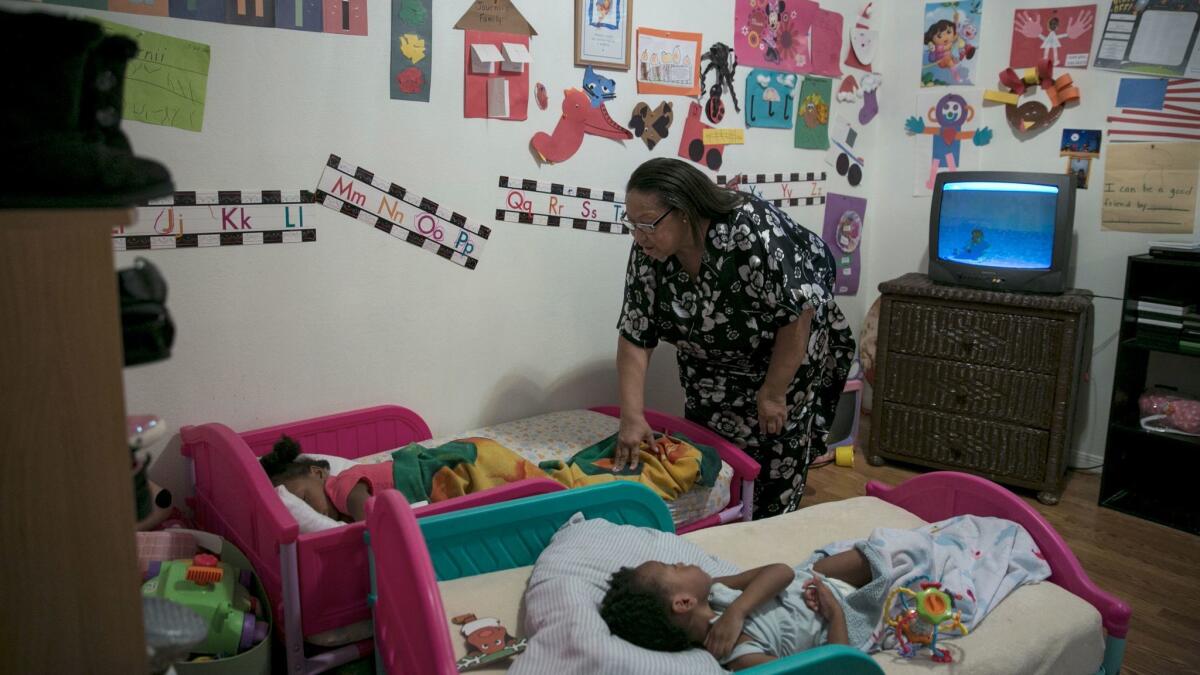
This story was reported with a grant from the United Nations Foundation.
For more on global development news, see our Global Development Watch page, and follow me @AMSimmons1 on Twitter
ALSO
Looking for Sgt. Bowe Bergdahl carried a heavy price, troops testify at his sentencing
As monuments to the Confederacy are removed from public squares, new ones are quietly being erected
Sign up for Essential California
The most important California stories and recommendations in your inbox every morning.
You may occasionally receive promotional content from the Los Angeles Times.








